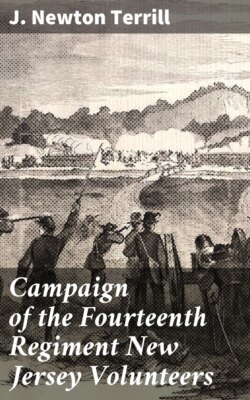Campaign of the Fourteenth Regiment New Jersey Volunteers

Реклама. ООО «ЛитРес», ИНН: 7719571260.
Оглавление
J. Newton Terrill. Campaign of the Fourteenth Regiment New Jersey Volunteers
Campaign of the Fourteenth Regiment New Jersey Volunteers
Table of Contents
Отрывок из книги
J. Newton Terrill
Published by Good Press, 2019
.....
The division was composed of three Brigades; the first consisting of the 151st N. Y., 6th N. Y. Heavy Artillery, 10th Vermont and 14th N. J., commanded by Brig. Gen. Morris, formerly Colonel of the 6th N. Y. The regiments were very large, numbering from eight hundred to one thousand men. We remained at the Gap five days, the Potomac army passing through, Lee having halted at Williamsport, the river being so high he could not cross. As the veterans of many a hard fought battle passed, they were loudly cheered by the new troops. Their soiled and worn out garments, and their decimated ranks contrasted greatly with our well filled ranks and new clothes. They looked upon us as new recruits, and remarks were frequently made by them not altogether suiting us. Some of them were that our regiments were as large as their brigades, and that we were too green for the front. Such remarks did very well for the time, as we were not inured to hardships as they were, but the war was not yet over. After serving their three years they lay quietly at their homes, while the boys that were then called green, were veterans, destined to see more hardships and more fighting than those that enlisted at the commencement of the war. Nine hundred and sixty rebels that were wounded, with ambulances and baggage wagons, were sent back by Gen. Lee with an escort, to Richmond. They were captured, together with several important despatches, by Kilpatrick's cavalry, and brought in camp for us to guard at Boonsboro Gap. Several of them were in a dying condition. They were very destitute and ragged, with scarcely anything to eat. The 10th Vermont guarded them to Washington. The Regiment was encamped on the spot where Gen. Reno fell at the battle of Antietam, a tree marking the spot. It was on the plantation of Dr. Wise, his well being filled with dead rebels thrown in for burial. Many a parent or loving wife will never know their fate, thinking perhaps they were prisoners, and at the close of the war would return to their homes; but they are now no more. With thousands of Union soldiers their bones rest on Southern soil, there to remain until the last trump shall sound to summon them to their final account before a just and holy God.
During the five days encampment at Boonsboro Gap, the weather was very stormy and disagreeable; everything was excitement, and we were confident that Lee and his army would be annihilated. The Potomac army with its re-enforcements was rapidly concentrating, having marched from Gettysburgh by various routes; flushed with victory they were anxious to be led forward. The rebel army being very much disheartened by defeat and scant of rations, some having five rounds of ammunition apiece, desertions from their lines were numerous, a great many Maryland soldiers returning to their homes sick and tired of rebeldom. Various rumors were in circulation, and all felt that a decisive battle would soon be fought, at what point none could tell, as none were certain of the whereabouts of Lee's main force, he having retreated from Gettysburgh in the darkness of the night; but it was supposed he was in the vicinity of Williamsport, preparing to re-cross the river into Virginia, and fall back as rapidly as possible, within the defences of Richmond. A courier bearing despatches from Jeff. Davis to Gen. Lee was captured by our scouts, and the despatches intercepted. They were orders from Richmond for Lee to fall back immediately, as the place was threatened by our forces under Butler from Fortress Monroe. Maryland now presented a scene of desolation and woe; houses pillaged, robbed and burned by the soldiers of both armies; trees were felled and rail fences demolished without regard to owners. Orders were read to the troops forbidding straggling, but by some those orders were not obeyed, and foraging soon became common. The poorer classes were on the verge of starvation, as everything they had was taken. The soldiers fared well, helping themselves to everything that came in their way, without regard to owners or to value, robbing hen roosts, killing sheep, hogs and cattle. Fields of grain were trampled upon and laid waste; horses and mules were turned loose to feed in fields of oats, wheat and clover.
.....